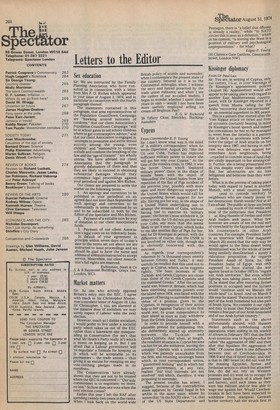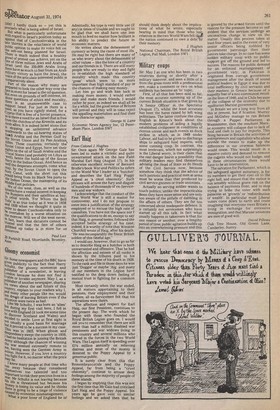Kissinger diplomacy
From Dr Paul Lax Sir: You are, in writing of Cyprus, only too correct, I fear, in your warnings of Dr Kissinger's appeasement policies (August 24). Appeasement would also appear to be taking place with regard to another East Mediterranean country, Israel, with Dr Kissinger reported in a speech from Miarna calling for the Arabs "recovering their lost territories" as an essential ingredient to ME peace. This is a pattern that started after the Yom Kippur attack on Israel and from, all accounts (certainly bearing in mind Dr Kissinger's latest speech and indeed the concessions he has so far managed to wrest from the Israelis) is a pattern that is likely to accelerate with Israel, twice the target of Arab attacks on her integrity since 1967, and having in each case won defensive wars against her immediate Arab neighbours, being ompelled to concede areas of land that. are vitally important to her strategically. Further, she is being pressurised into all this despite every clear indication that her adversaries are no less belligerent and bellicose than they were be
What is in the process of taking place today with regard to Israel is another Munich, with a small country being neighbo
ounresd wthou caor en cued eea r tye rri ni tt eo nr yt On o her destruction. Harsh words? Not stall 'I am afraid. The public at large are being nwashed by much of the media and most of the politicians that President Z., at, King Hussein of Jordan and other Arab leaders seek peace. What few however are aware of are the real sort of views held by the Egyptian leader and his counterparts in other Arab Countries, For example, President Sadat in an interview with Time magazine (March 25) stated that the only way he would agree to the Sinai desert being demilitarised was for the whole of Israel being similarly demilitarised — surely a ridiculous proposition. As regards President Assad of Syria, he, like President Sadat of Egypt, was only supposed to have started the war against Israel in October 1973 to "regain lost Arab territories." But even whilst fighting was taking place, on October 16, he stated that after restoring Syrian positions in occupied land the Syrians would -continue until we liberate the whole land" i.e. Israel. And on March g this year he stated "Palestine is not only part of the Arab homeland but also part of South Syria. We consider it our right and duty to insist that Palestine should remain a free part of our Arab homeland and of our Arab Syrian country."
Statements such as the above unfortunately abound, with Hussein Heikel perhaps. symbolising Arab aspirations when stating in his weekly Ai A hram in February 1971 that the first Arab intention was to liquidate what he called "the aggression of 1967 and then after that liquidate the aggression of 1948." Of course there is one difference. between that of Czechoslovakia in 1938/9 and that of Israel today, and that is that in 1967 Israel (a) did not wait for the massing Egyptian, Syrian and Jordanian armies to attack but attacked first, (b) did not rely on Western promises and (c) went on to occupy its enemies' lands (much of it albeit bare and barren), until such times as they were less militant and/or less able to wage war against her. Would Czechoslovakia in fact have been expected to withdraw from marginal German border territory had she struck first in
1938? I hardly think so — yet this is Precisely what is being asked of Israel. But what is particularly unfortunate With regard to Israel's position today as against that of Czechoslovakia in the late 'thirties is the reluctance of world Public opinion to make its voice felt on the sell-out being planned for Israel. There is much indeed that a healthy powl of protest can achieve, yet on the te of three million Jews and Arabs of Israel (and the 350,000 Arabs living there have as much to fear from an Arab Military victory as have the Jews), the voice of the articulate interested public is oarnparatively silent. Part of the reason why many are Prepared to look the other way over the • fate in,store for Israel is the oil question. But even on grounds of self,interest, let alone questions of ethics and morality, there is an unanswerable case to suPPort Israel. For just as there is a
ee.r1
as You have rightly stated, for a 'YPrus that is free of a Soviet presence, so is there a need for an Israel that is free from the clutches of the Kremlin and its Arab allies. It is indeed Israel alone that is stopping an unfettered advance southvvards to the oil-bearing states of Saadi Arabia and the Persian Gulf by the Soviet Union and its Pan-Arabiarti Allies. These countries, certainly the Soviet Union and Egypt, have set their Ights on the oil of Saudi Arabia and the meal States (and probably on Libya as hence the build-up of the Soviet "avY in the Indian Ocean. And hence as Well the desperate attempts, come what 1,!laY, by the Soviet Union to open the 'uez Canal, with the short cut this :would bring from its Black Sea ports to
Indian Ocean, the mainspring of its iddle East policies.
, We of the west, then, as well as the 1"aeli5 have a vested interest in keeping the Russians and their satellites at bay. !rn other words, 'For Whom the Bell oils' is as true today as it was in 1938 and 1939 when we thought it quite in 2.rder to desert Czechoslovakia only to °vertaken by a worse situation on emorrow. Will we of the west never, fact, learn that dictators cannot be Listed and that the fate of others Sobbled up today is in store "for us tomorrow.
Pau/ Lax
20 Parkhill Road, Shortlands, Bromley, Kent



































 Previous page
Previous page